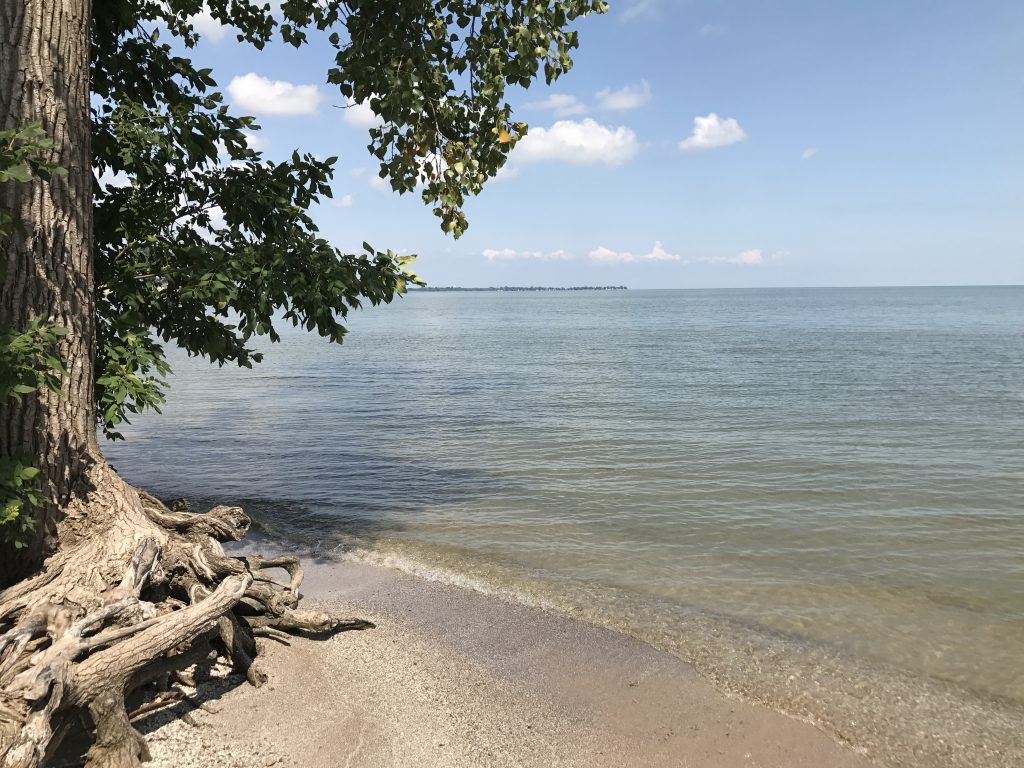Rising Water Levels in Great Lakes Bring Flood Concerns to Shore
Cyclical changes in lake levels is expected and can be good. But drastic changes seen in recent years cause concerns, experts say.

People who own property along Lake Erie and Lake St. Clair have struggled with rising water levels this spring. Higher-than-average rainfall in May swelled both lakes, and the problem might only get worse this summer.
“Record highs were set in May on a few of our Great Lakes, and our June forecast shows additional record highs likely this summer,” says Keith Kompoltowicz, chief watershed hydrologist for the U.S. Army Corps of Engineers in Detroit. The corps monitors lake levels and updates them weekly. Kompoltowicz says lakefront property owners face an ongoing threat of flooding and beach erosion.
“In 2013, we had historic low levels, and now here we are in 2019 with historic high levels.” — Nick Schroeck, environmental law professor.
Lake levels go up and down over time, but environmental expert Nick Schroeck says those fluctuations have been more extreme lately.
“What we’re seeing now is this really drastic shift between low lake levels. In 2013, we had historic low levels. Now, here we are in 2019 with historic high levels,” Schroeck says.


While higher water levels can cause flooding and beach erosion, Schroeck says low levels have a potentially greater impact on the region’s economy.
“Ships can’t carry as much cargo when you have lower water levels,” Schroeck says. “They can’t fit through the channels, so they have to carry lighter loads.”
Click on the audio player to hear the conversation with WDET’s Pat Batcheller and read excerpts from the Q&A, edited for length and clarity, below.
WDET: So what kind of problems does drastic fluctuations in lake levels cause?
Nick Schroeck, environmental expert: Well the high lake levels can be very dangerous in terms of different coastal hazards. So, flooding. If you have a wind direction shift or high winds blowing, which we’ve already seen this spring here in Michigan on Lake Erie, Lake St. Clair and Lake Ontario, where you have homes that are flooded, roads washed out, potential erosion problems along the shoreline. It also impacts beaches. If you have an inch or two change in water level in some areas, that can dramatically decrease the amount of shorefront and beach that you have, so it makes it harder for people to walk along the shore to enjoy the beaches in the summer.
When you look at low water levels that has more impact potentially economically, because ships can’t carry as much cargo when you have lower water levels they can’t fit through the channels so they have to carry lighter loads. That’s what was happening back in 2013, where there was a lot of alarms being raised about, gosh, we’re going to have all these increases in costs of goods because the ships can’t carry as much cargo on the Great Lakes.
If lake levels are too low, that can also hurt recreation, like boating and fishing. Is there any benefit to higher lake levels?
It’s definitely good that we’re not seeing times of drought. There’s always challenges with these precipitation changes. This is going to be a very difficult planting season for a lot of farmers all around the Great Lakes region, so that’s one negative. As far as the Lakes themselves it’s good to have these historic changes because a lot of wildlife and plant life, they’re actually tied to these changes. You’ll have certain plants that only bloom and only reproduce in times of lower lake levels. So you have these sort of cyclical changes that are really important to our ecosystem and how it’s evolved over the last few thousand years.
Do higher lake levels help with, say, diluting algae or preventing stagnant water where mosquitos can breed and waste can collect?
Well it is good that you can flush out stagnant areas of water. But the thing with the higher lake levels now that we’re seeing is that there’s actual concerns of more run-off from urban areas and also, the key point is from agricultural areas, where we’re going to see more run-off of fertilizer getting into Lake Erie cause of all this precipitation. So the concern is that we’re going to have a bigger algae bloom in Lake Erie this year because of all of this rain, the time the rain has been occurring, and all of that fertilizer is just getting washed into Lake Erie.
So, yes, it’s good to recharge the system, refresh it with some rainwater, but that also carries with it pollutants and contaminants from the shore that get into the water as well.
